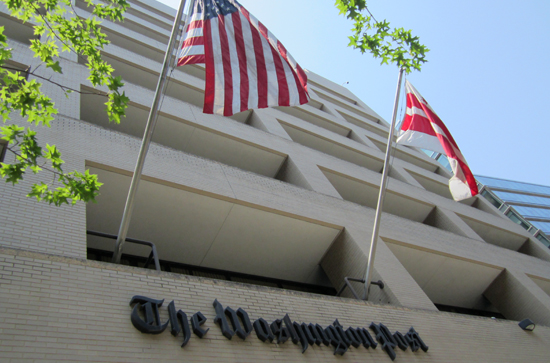
From Katharine Graham and Watergate to Don Graham and the internet, the Graham family saw the Washington Post through its heydey – and demise, Ed Pilkington reports from New York.
ANALYSIS: The picture tells the story: five people are captured from behind as they walk towards the exit of the boomingly empty auditorium of the Washington Post building. Don Graham, the head of the legendary newspaper family, is on the left of the group, flanked by his wife and children. The photograph was posted online by Marcus Brauchli, a former executive editor of the Post, shortly after Graham announced to a stunned newsroom that after 80 years in family hands the paper was being sold to Amazon founder Jeff Bezos for $250 million.
The photograph was posted online by Marcus Brauchli, a former executive editor of the Post, shortly after Graham announced to a stunned newsroom that after 80 years in family hands the paper was being sold to Amazon founder Jeff Bezos for $250 million.
"A brave, selfless act, as hard as any, done with dignity and from loyalty," Brauchli wrote beneath the image of the Grahams' final moments in the institution they had so long cherished.
Whether media historians look back on the sale as a selfless act of bravery will depend largely on how Bezos conducts himself in coming years. But no one can dispute how hard the move was, for Graham personally, for the wider family whose ownership stretches back to 1933 when the financier Eugene Meyer bought the Post in a bankruptcy sale, and for the staff of the paper.
The shock announcement led to an outpouring of sadness and nostalgia from the building. One reporter recalled on Twitter the congratulatory notes that Don Graham would regularly distribute to the authors of articles he had enjoyed: "One of the great joys of working at Donald Graham's Post: receiving a Donniegram in praise of an article. The newsroom's favourite reader."
The shockwaves caused by the passing of the Graham era rippled far beyond the newspaper itself, well beyond even Washington. The Washington Post, arguably even more than the titan of US journalism the New York Times, came to epitomise the heyday of newspapers in America.
That reputation had everything to do with Don Graham's predecessor and mother, Katharine Graham, who was thrown into the man's world of newspapers upon the suicide of her husband Philip Graham in 1963 and instead of quitting, outclassed them all. Three years after taking over the helm she was given the closest thing to a coronation in a republic: she was guest of honour at Truman Capote's Black and White Ball.
Formidable act
Forging a formidable double act with her chosen editor in chief, Ben Bradlee, she matched glamour with gutsiness, standing behind her journalists as they negotiated choppy waters. First they succeeded along with the Times in batting off the threat of prior government restraint on publication of the Vietnam war Pentagon Papers, then in 1972 they hurled themselves into Watergate.
"The whole world was against us, and against her," says Len Downie, executive editor of the Washington Post from 1991 to 2008. "As important as Watergate was in political history, the importance to us was Katharine Graham's unstinting and vigorous support."
Downie recalls listening over Carl Bernstein's shoulder as the reporter was on the phone to President Nixon's attorney general John Mitchell when the official issued the memorable threat that if the Post went ahead with an upcoming article then "Katie Graham's gonna get her tit caught in a big fat wringer."
"No matter how tricky it was, no matter if the president was opposed to publishing, we always had the Grahams' backing," Downie says.
Those days, challenging though they were journalistically, were easy at least in one regard – the money flow. From the 1970s through to the 1990s, the Post held a largely monopoly position in Washington, had only three TV networks to compete with for advertising and enjoyed a solid base at the peak in 1993 of more than 800,000 daily subscribers.
Then came the internet, and the ravages that have been felt by newspapers around the world. The turbulence that the Post experienced makes for a familiar story, of plummeting advertising revenues and dwindling circulation down to today's subscription base of fewer than 500,000.
On top of the general collapse of the economic model, there were mistakes and missed opportunities specific to the Washington Post. In 2005 Don Graham let a substantial share in a small internet start-up slip through his fingers: it was called Facebook.
Strategic thinking
The paper agonised over the best way to build on the internet, leading to some odd strategic thinking. It started well by opening one of the earliest websites for a major newspaper, but then conceived the less happy innovation of sticking the internet newsroom out in Virginia, miles away from the main newspaper building.
The Washington Post has also struggled increasingly with a definition of itself, of its readership and of its purpose. Was it a local paper serving the greater Washington area with news about itself, or was it a great national title founded upon its political coverage? Amid dithering over the answers to such questions, it let the horse bolt with the stable with the departure in 2007 of senior journalists who founded the highly successful specialist news website Politico.
Monday's decision by the Graham family to hand over the baton to Bezos is in itself a tacit recognition that a style of leadership that was eminently suited to the Woodward-and-Bernstein heyday of newspapers may not be the way forward in the current rambunctious times.
As Downie puts it: "Jeff Bezos is from another generation. He may be better able to cope with the outside forces that are battering the newspaper business than the Graham family that grew up in another world."
This article was first published in The Guardian.
Media council in the works following threats from Speaker
PM scoffs at Opposition Leader’s Fiji media freedom link
This work is licensed under a Creative Commons Attribution-NonCommercial 3.0 New Zealand Licence.




